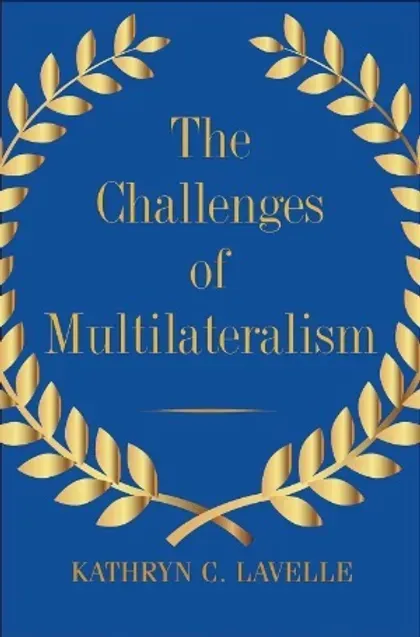
Book Review: The Challenges of Multilateralism and 100 Years of Multilateralism in Geneva
Can a system deadlocked and under massive strain still leave room for hope?
Can a deadlocked system under massive strain still leave room for hope? Yes, argues Kathryn Lavelle in The Challenges of Multilateralism. As she studies and reflects on the long arc of history, going back to the first Industrial Revolution, Lavelle approaches multilateralism as a tool for managing our interdependence rather than a grand inspiration condemned by its own failings. “Society will develop by our living it, not policing it,” she quotes British historian David Mitrany, the theoretician of “functionality” in international relations.
No matter how elusive the idea of global cooperation and solidarity might seem today, her main contention is that multilateralism is thus endowed with a built-in resilience. One wonders if The Travails and Tribulations of Multilateralism might not have been a more apt title for her book as she rightly forces us to accept, if not embrace, that, as she puts it “Multilateralism is a study of contrasts in motion. (…)
The narrative thread that knits together the appearance and growth of multilateralism is the interplay among the societal changes associated with industrialization, capitalist production, globalizatio,n and war in the nation-state system. As I see it, the challenges of multilateralism come from the dynamic process associated with scientific discovery and the industrial production of goods and services.(…) The incredible part of the story is that despite catastrophic failures along the way, humanity keeps trying new ways to cooperate and to include more groups in these attempts.” as he contemplated the birth of the United Nations.

The current concomitant challenges posed by a global pandemic, American disengagement from the multilateral system, a massive level of discontent around the contradictions of financial capitalism and the redistribution of the centers of global powers—all issues she addresses—make The Challenges of Multilateralism a very timely book. With the ongoing drama around the WHO which sees geopolitics collide with our ability to find a response and a cure to COVID-19, readers here might be particularly interested by Lavelle’s chapter on global health, “Wellness of People and the Planet.” As she reminds us, the first calls for global health governance came from the outbreak of cholera on trade routes and the need to protect populations from the disease.
“The growing participation of China in multilateral arrangements poses a new existential question about whether the liberal international order can be championed by a state that does not share the same domestic political values that previous champions have promoted”
In this easy to read essay, written for a wide audience, Lavelle also recounts how philanthropy, most notably thanks to the Rockefeller Foundation, took a preeminent role in driving the push for cooperation around health. Philanthropists stepped in, she explains, while the US entertained, arguably with varying degrees and notwithstanding the building of a post-World War II Pax Americana, some ambivalence about multilateralism. Although not the subject of her book, a lengthier examination of the China question would have been welcome. “The growing participation of China in multilateral arrangements poses a new existential question about whether the liberal international order can be championed by a state that does not share the same domestic political values that previous champions have promoted,” she writes. It is appearing increasingly clear that the broader question is whether the strengthening of Xi Jinping’s coercive powers within China will now be a feature of China’s external behavior. That might prove to be the ultimate challenge to multilateralism.
100 years of Multilateralism in Geneva: From the League of Nations to the UN
A coffee table book that is more than a coffee table book. A book that you don’t just want to look at but that you also want to read. This nicely illustrated collection of short essays, edited by Olga Hidalgo-Weber and Bernard Lescaze and published by Les Editions Suzanne Hurter, chronicles 100 years of multilateral history in Geneva. Beginning with the creation of the League of Nations in 1919, rather than with the traditional birth of the Red Cross in 1863 milestone, the book is structured in three parts. The first revisits the profound forces at work behind the creation of the League of Nations (and the International Labour Organization), their activities in the inter-war period, and finally their failure to prevent the Second World War. The second part presents the establishment of the post-war multilateral order and its functioning in Geneva throughout Cold War era. Finally, the book discusses Geneva and the modern era of multilateralism: the return of a multipolar world with new uncertainties.
One of the pleasures of reading the book lies in the range of its contributors who, in addition to historians Lescaze and Hidalgo-Weber, range from the heart of the Institutions. Most of them are known Geneva personalities: former and current UNOG directors Michael Møller and Tatiana Valovaya, and ILO historian Dorothea Hoehtker. Others hail from academia, among them Robert Kolb, Sandrine Kott, Ozcan Yilmaz, and Miriam Piguet, IHEID's outgoing director Philippe Burrin and Ilona Kickbusch, as well as The Geneva Observer contributor Daniel Warner. Two former elected officials, Robert Cramer and Guy-Olivier Segond also have contributions.
Kudos to Les Editions Suzanne Hurter for editing an English version.
You can download the English introduction from Olga Hidalgo-Weber and Bernard Lescaze below.
